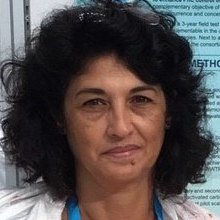Eutrophication Status of Coastal Lagoons
A special issue of Journal of Marine Science and Engineering (ISSN 2077-1312). This special issue belongs to the section "Coastal Engineering".
Deadline for manuscript submissions: closed (10 October 2021) | Viewed by 533
Special Issue Editors
Interests: environmental quality in coastal areas; water quality and hydrodynamic modeling; nowcast–forecast systems for water quality; in situ data acquisition and online monitoring networks; effects of climate change on water quality and ecological dynamics
Special Issues, Collections and Topics in MDPI journals
Interests: coastal lagoons; marine chemistry; environmental chemistry; water quality and environmental contamination of coastal areas; eutrophication; impacts of wastewater disposal
Special Issue Information
Dear Colleagues,
Coastal lagoons are among the most productive ecosystems in the world and provide multiple ecosystem goods and services, such as aquaculture, marine transportation, water quality regulation and tourism. They harbor ecologically important habitats and support diverse human activities that provide resilience to the coastal communities. However, coastal lagoons are under a multitude of pressures and threats that may affect their ecosystems’ dynamics. Nutrient enrichment from terrestrial and coastal activities is an example of such pressures that can alter the ecosystems natural functioning and, consequently, their resilience. Although episodes of eutrophication are natural, cultural eutrophication is increasing worldwide due to an increase of nutrients from anthropogenic sources. Eutrophication consequences can be diverse and may lead to harmful or toxic algal blooms, affect the nutrient cycles, promote local hypoxic and anoxic conditions, and influence the food web, among others. The increase of anthropogenic uses in coastal areas and climate change may exacerbate these impacts and increase the vulnerability of coastal populations.
This Special Issue intends to collect original research articles on all aspects of eutrophication of coastal lagoons. We invite high quality research papers on various topics related to this issue, including but not limited to long-term monitoring of coastal eutrophication, water quality and environmental contamination, observation networks, numerical modelling of water quality and ecological processes, impacts of wastewater disposal, impacts of climate change, forecast systems, assessment of ecosystem services, coastal management of eutrophication.
Dr. Marta Rodrigues
Dr. Alexandra Cravo
Guest Editors
Manuscript Submission Information
Manuscripts should be submitted online at www.mdpi.com by registering and logging in to this website. Once you are registered, click here to go to the submission form. Manuscripts can be submitted until the deadline. All submissions that pass pre-check are peer-reviewed. Accepted papers will be published continuously in the journal (as soon as accepted) and will be listed together on the special issue website. Research articles, review articles as well as short communications are invited. For planned papers, a title and short abstract (about 100 words) can be sent to the Editorial Office for announcement on this website.
Submitted manuscripts should not have been published previously, nor be under consideration for publication elsewhere (except conference proceedings papers). All manuscripts are thoroughly refereed through a single-blind peer-review process. A guide for authors and other relevant information for submission of manuscripts is available on the Instructions for Authors page. Journal of Marine Science and Engineering is an international peer-reviewed open access monthly journal published by MDPI.
Please visit the Instructions for Authors page before submitting a manuscript. The Article Processing Charge (APC) for publication in this open access journal is 2600 CHF (Swiss Francs). Submitted papers should be well formatted and use good English. Authors may use MDPI's English editing service prior to publication or during author revisions.
Keywords
- coastal lagoons
- monitoring
- numerical modelling
- nutrient enrichment
- marine chemistry
- coastal ecosystem services
- coastal management
- climate change impacts
- anthropogenic pressures
Benefits of Publishing in a Special Issue
- Ease of navigation: Grouping papers by topic helps scholars navigate broad scope journals more efficiently.
- Greater discoverability: Special Issues support the reach and impact of scientific research. Articles in Special Issues are more discoverable and cited more frequently.
- Expansion of research network: Special Issues facilitate connections among authors, fostering scientific collaborations.
- External promotion: Articles in Special Issues are often promoted through the journal's social media, increasing their visibility.
- Reprint: MDPI Books provides the opportunity to republish successful Special Issues in book format, both online and in print.
Further information on MDPI's Special Issue policies can be found here.






